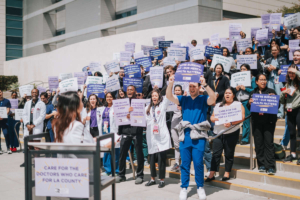MEDICAL RESIDENTS NOW A NEW FRONT IN UNION ORGANIZING

Resident physicians at LA General in Los Angeles, California, rally outside the hospital on April 3, 2025, for a fair contract. DEANDRE JACKSON
Resident physicians are doctors who have graduated from medical school and are now on hospital staffs. They are akin to apprentices before becoming fully licensed. In many hospitals and emergency rooms they are the ones who deal with patients on a daily basis.
They work very long hours under often stressful conditions. Their pay is low, considering their training and the importance of their work. That is why they have become a new front in labor organizing.
Across the country in the last few years medical residents have been unionizing and striking by the thousands. They comprise some of the largest new units to unionize in the United States. Some 40,000 of them are now members of Committee of Interns and Residents, a part of the Service Employees International Union (SEIU).
“Medical residents are monumental to the care that patients receive,” declared Dr. Armin Tadayyon, a resident physician at the University of Buffalo’s affiliated hospitals who helped lead a strike last year of residents affiliated with another organization, the Union of American Physicians and Dentists, that resulted in their first contract. In an interview with Truthout, an online publication, Dr Tadayyon explained, “Our labor holds the hospital afloat. Most of the direct patient contact is with residents. If residents don’t show up to work, the hospitals are in crisis mode.”
Another resident interviewed, Dr. Mahina Iyengar of the Los Angeles General Medical Center, elaborated:
“In many hospitals you visit, the residents will be the people taking care of you. They’re the backbone of whatever hospital they’re working at.
“We pretty much do everything, depending on the specialty. We’re usually in the hospital before 6:00 am. We do multiple rounds a day with patients. We order medications, call families for information, consent patients for surgeries, perform surgery under supervision, talk to nurses, explain treatment plans, and much more. Almost all this day-to-day work is done by interns, residents, and fellows.
“ Resident physicians have been overworked and underpaid for decades,” said Dr. Iyergar, “as we’ve seen the consolidation and corporatization of health care. We’ve been taught over generations to just push through and ignore our working conditions.”
What prompted the change in residents’ attitude was the Covid pandemic where they were working 14 and 16-hour days and 80-hour weeks. Their collective realization of their exploitation by hospitals who were completely dependent on their labor led to their desire to organize.
Unionization has helped residents advocate for better patient care and get funds for equipment and supplies that patients need. Patients are ill-served by attending physicians who are exhausted after putting in 16-hour shifts.
Now hospitals find that a new generation of residents are union-minded and wish to be part of the labor movement.


